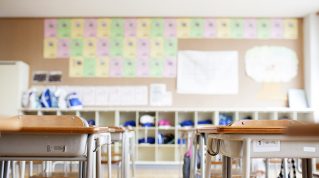MPs have warned the legacy of Covid will “damage the prospects of a generation” and “entrench disadvantage” without faster action from government.
It comes after the Department for Education (DfE) admitted it could take a decade for the disadvantage gap to return to pre-pandemic levels.
In a report on education recovery in schools, published today, Parliament’s public accounts committee (PAC) also urged the government to address slow take-up of the National Tutoring Programme (NTP) and high absence rates.
“Without the [DfE] taking faster and more effective recovery action, the legacy of the Covid-19 pandemic will be with us for a long time, damaging the prospects of a generation of children and entrenching disadvantage,” the report stated.
Cross-party MPs on the committee urged the department to publish a plan setting out how it will reduce the attainment gap “as quickly as possible”, alongside the expected trajectory.
Performance data from last year’s exams showed the attainment gaps between disadvantaged key stage 4 and key stage 2 pupils and their better-off peers had widened to their largest levels in 10 years.
While the report said the DfE had “insisted” the issue had been “the relentless focus” of its Covid recovery programme, it added that it should be able to reduce the gap at least as quickly as it had done in the decade before the pandemic.
DfE needs to better understand absence
The rise in absenteeism was also scrutinised by the PAC.
DfE data shows that persistent absenteeism – where pupils miss 10 per cent or more class – rose from 10.9 per cent in 2018-19 to 22.5 per cent last year.
Previous evidence has identified that poorer pupils are more likely to be absent.
While the government has put in place measures to tackle rates, including attendance hubs and a separate parliamentary inquiry, the committee said it needed to “develop a better understanding” of the issue.
Ministers must also take additional “targeted action” to reduce absence rates among disadvantaged pupils, the report added.
MPs said they shared the DfE’s “disappointment” that 13 per cent of schools did not take up its flagship catch-up programme the NTP in the last academic year.
They called on the department to “do more to understand” why some schools were not taking part and “take more effective action to increase participation”.
If tutoring levels drop significantly once government subsidies for the scheme end in 2024, the DfE should “intervene”, they added.
“After that, schools will have to cover the full cost of tutoring from other sources… School budgets are already under significant pressure,” the report stated.
Ministers should report progress on attainment to parliament
In its 2022 schools white paper, the DfE out its ambition for 90 per cent of primary pupils to meet the expected standard in reading, writing and maths by 2030.
But ministers are currently further away from where they started at key stage 2 – 65 per cent in 2019 – with the percentage of children leaving primary at the expected standard falling to 59 per cent last year.
In the report, PAC said the government should set out measures of progress for its ambition, with measures for primary pupils published by this summer.
It should then report progress against its measures to parliament each year.
Dame Meg Hillier, chair of the committee, said the DfE did not seem to “appreciate the pressures schools are under as they seek to help pupils catch up”.
“It is therefore essential that government reckons with the reality of the situation,” she added.
“Without swift action, the slow-motion catastrophe of the pandemic for children’s education, and in particular for disadvantaged children, will continue to have far-reaching consequences for an entire generation.”
Responding to the report, a DfE spokesperson said it was “conscious of the effect of the pandemic…which is why we have made £5 billion available for education recovery”.
“We remain committed to addressing the attainment gap which is why the National Tutoring Programme is targeted at the most disadvantaged students and has had over three million course starts to date, backed by more than £1 billion investment.”









Your thoughts